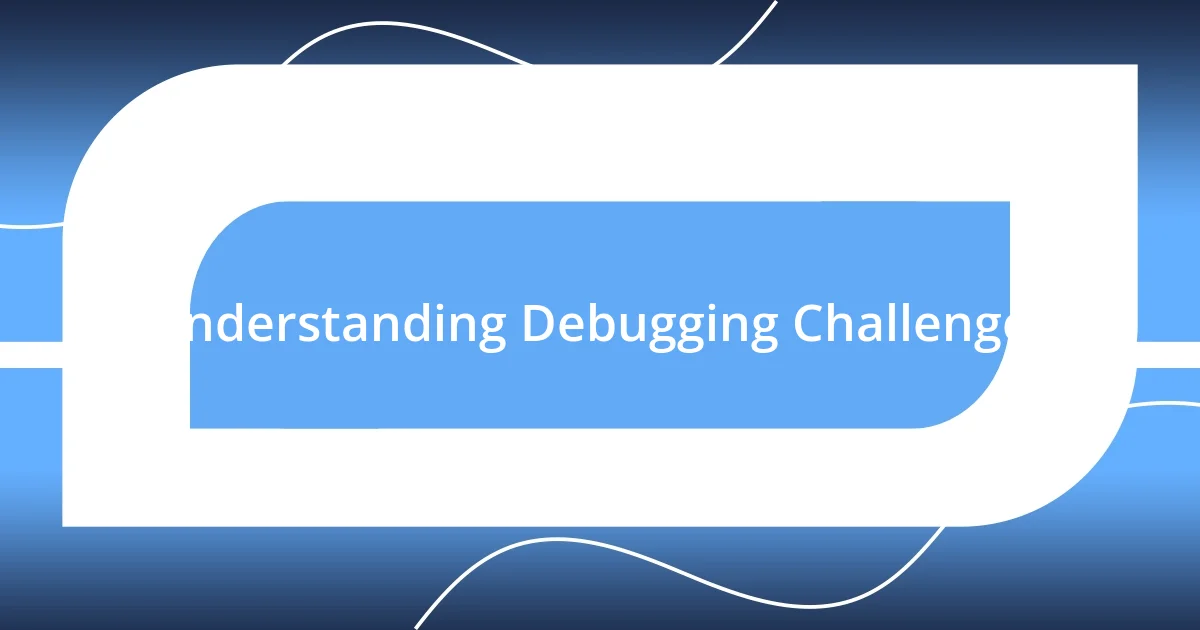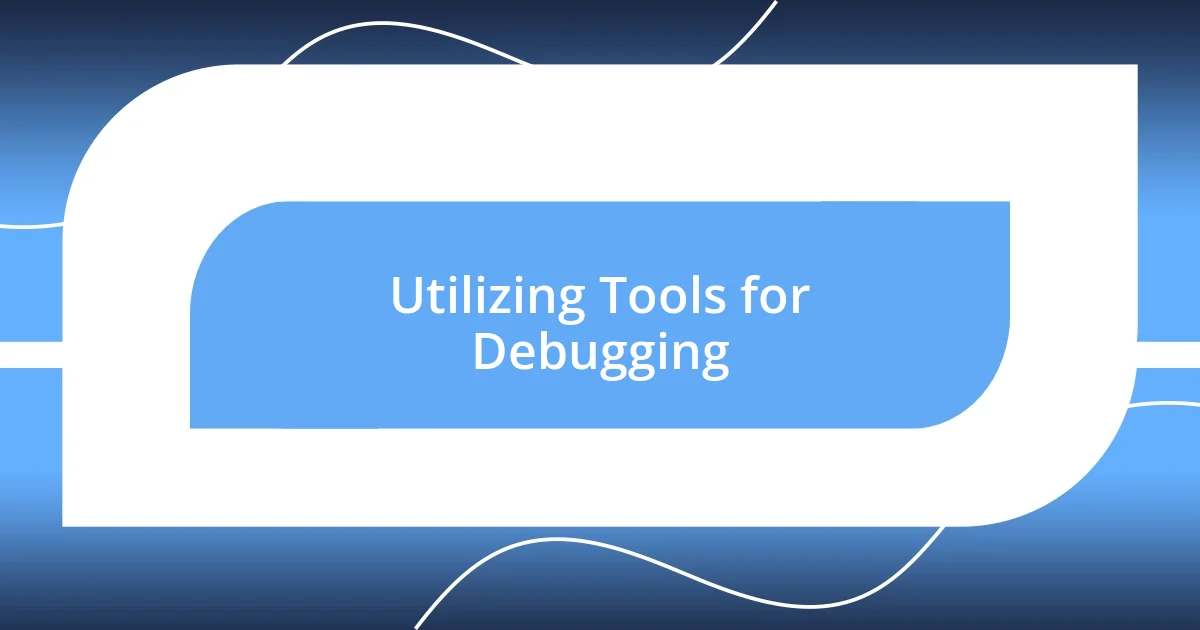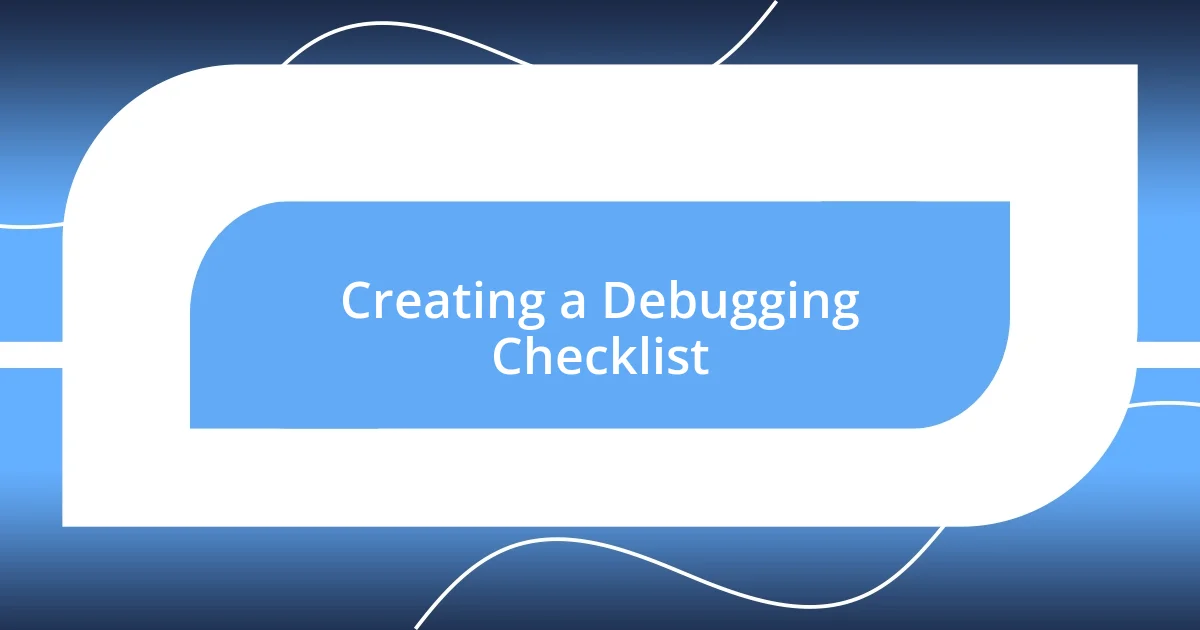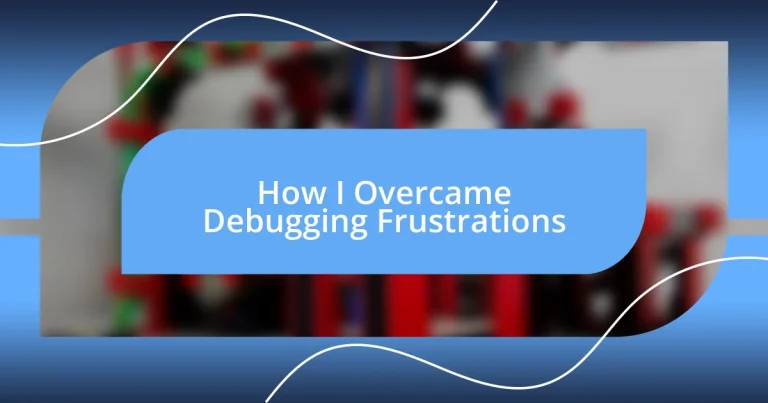Key takeaways:
- Debugging challenges often stem from simple errors and can test patience; embracing mistakes fosters learning and resilience.
- Effective strategies include breaking down complex problems, documenting the process, and utilizing debugging tools to improve efficiency and insight.
- Creating a personalized debugging checklist helps streamline troubleshooting and allows for reflection on experiences to prevent future mistakes.

Understanding Debugging Challenges
Debugging is often a journey through the unknown—a maze where the exit feels just out of reach. I remember staring at my code one late night, feeling utterly overwhelmed as bugs seemed to multiply instead of vanish. Why does it always happen at the most inconvenient times? It’s like the universe is conspiring against our productive hours.
One of the biggest challenges I faced was identifying the root cause of an issue. I spent hours, painstakingly checking line after line, only to discover it was a simple typo buried among hundreds of lines. It makes me wonder: how many times do we think it’s about the complexity instead of a small oversight? This kind of frustration not only tests your technical skills but also your patience and resilience—qualities that are essential in this field.
I’ve found that each debugging challenge often feels like a personal attack on my confidence. It’s during these moments of self-doubt that I ask myself—what if this is a chance to learn something new? Instead of shying away from mistakes, embracing them can lead to unexpected breakthroughs and a much deeper understanding of both the code and myself.

Common Debugging Pitfalls
Common debugging pitfalls can lead developers down frustrating paths. One common trap is overlooking simple errors, like missing semicolons or mismatched parentheses. I recall a time when I spent days trying to fix a feature only to discover my debug console was littered with warnings about an unclosed bracket. It was a stark reminder that sometimes the simplest mistakes can trip us up the most.
Another significant pitfall is the tendency to blame external factors. Early in my career, I would often think that the debugging issue was due to a faulty library or an issue with the environment. However, I learned that it’s essential to take ownership of my code. Examining my logic and assumptions before looking outward allowed me to solve problems faster. It instilled a sense of accountability in my work, which ultimately made me a stronger developer.
Lastly, failing to document the debugging process can turn into detrimental oversights. I used to jot down notes only sporadically. Then, I experienced a scenario where I had to revisit an old project and couldn’t remember the context of my previous findings. Now, I’ve made it a habit to maintain a debugging diary. It’s amazing how regular notes can simplify troubleshooting and serve as a learning tool, helping me avoid the same pitfalls in the future.
| Common Pitfalls | Description |
|---|---|
| Overlooking Simple Errors | Missing semicolons or parentheses can lead to significant delays in debugging. |
| Blaming External Factors | Attributing errors to external libraries without examining your own code first. |
| Failing to Document | Not keeping thorough notes can result in repeating mistakes and lost context. |

Effective Debugging Strategies
Effective debugging strategies have been my saving grace in navigating through the often chaotic world of coding. A prominent technique I’ve come to rely on is the “divide and conquer” approach. When faced with a particularly complex bug, I break the code down into smaller sections. It’s almost like treating each part as a mini puzzle. I remember tackling a stubborn feature where the issue seemed to hide in plain sight. By isolating the smaller functions, I quickly identified the culprit. This not only keeps the process organized but also reduces my frustration significantly—because, let’s be honest, seeing progress is a great emotional uplift.
Here are some effective strategies I’ve found invaluable:
– Divide and Conquer: Break down your code into manageable sections.
– Use Print Statements: Sometimes, I just throw in print statements to trace the flow of my program. It feels like creating a breadcrumb trail.
– Rubber Duck Debugging: Talking through problems—even to an inanimate object—has helped clarify my thoughts. I’ve had moments where explaining my code out loud unveiled the solution!
– Check the Documentation: I often refer back to documentation or resources to ensure I’m utilizing APIs correctly. It’s a solid confidence booster.
– Take Breaks: Stepping away from the screen for a short walk or simple distraction can provide a fresh perspective. I’ve returned with new insights more times than I can count.
One of the most profound steps I’ve integrated into my routine is maintaining a debugging journal. Initially, I jotted down notes on an ad-hoc basis, but I realized that consistency was key. Each time I encountered a problem, I’d document my thought process, the attempts I made, and the eventual resolution. Reflecting on past experiences is beneficial—not just technically, but emotionally. It reassures me that I’ve tackled similar challenges before and emerged victorious. I still look back at a time when I was utterly lost in a large codebase, but finding a note detailing a similar issue reminded me of the path I took, giving me renewed motivation.
Consider incorporating these additional strategies into your debugging practices:
– Create a Debugging Journal: Document your challenges and solutions regularly.
– Engage with a Peer: Sometimes, just bouncing ideas off someone else can shed light on a problem.
– Practice Mindfulness: Staying calm in the face of frustration can prevent the coding blues.
– Workflow Adjustments: Experiment with different workflows to find out what feels right for your debugging process.
– Celebrate Small Wins: I always take a moment to acknowledge when I squash a bug, no matter how small. It keeps my spirits up!

Utilizing Tools for Debugging
Utilizing the right tools for debugging can be a game changer. I remember a time when tracking down the source of a bug felt like finding a needle in a haystack. That’s when I started leaning heavily on debugging tools like breakpoints and step-through debuggers. Watching my code run line by line opened my eyes to issues I hadn’t considered before. It’s fascinating how these tools can illuminate the dark corners of your code, helping you see exactly where things go awry.
I often find myself realizing that a good Integrated Development Environment (IDE) can make all the difference. I’ve experimented with several, and it wasn’t until I discovered one that had built-in syntax highlighting and real-time error detection that I truly felt in control. Just the other day, I was working on a project when the IDE flagged an unreachable code section. It saved me hours of frustration! I wonder how many headaches could be avoided if more developers leveraged these technological advancements.
Another aspect that I’ve come to value is the use of profiling tools. Initially, I didn’t see the importance of analyzing the performance of my code. However, after being blindsided by a sluggish application, I ran a simple profile check, and it unveiled bottlenecks I hadn’t even noticed. It was a real eye-opener that taught me not just to fix bugs, but also to optimize my code for the best performance. Do you use profiling tools? If you haven’t yet, I truly recommend diving into this aspect of debugging; the insights can be incredibly rewarding!

Creating a Debugging Checklist
Creating a debugging checklist has transformed how I navigate coding issues. Whenever I encounter a problem, I pull out my checklist, which includes steps like ensuring the environment is set up correctly, verifying inputs and outputs, and checking for syntax errors. It’s almost like having a trusted companion to guide me through the fog of confusion. Have you ever felt like you’re chasing your own tail? That’s how I used to feel until my checklist helped bring clarity.
One time, I was stumped trying to figure out why a feature wouldn’t work as intended. It was a minor oversight—I’d forgotten to update a dependency. But recalling my checklist prompted me to double-check my versions, and there it was, staring me in the face. The relief that washed over me was incredible! Creating this checklist wasn’t just a one-time task; it’s an evolving resource.
As I grew more experienced, I started adding personalized items to my checklist based on the common issues I face. For example, now it includes reminders to clear cache or restart the application. I’ve found this not only speeds up my debugging process but also helps prevent the frustration that comes with time wasted. Do you have your own checklist? If not, I encourage you to start one—it’s surprisingly empowering!

Learning from Debugging Mistakes
Learning from debugging mistakes has been a pivotal part of my growth as a developer. I still remember the time I spent a whole afternoon chasing down an elusive bug, only to discover I had misconfigured a variable. The frustration was palpable, but when I reflected on the experience, I realized that I hadn’t thoroughly checked my assumptions. This prompted me to adopt a mindset of questioning—what if I’m wrong about this? It’s amazing how altering your perspective can drastically change the debugging experience.
One of the most empowering lessons I learned came from a particularly humbling incident during a team project. We deployed code that worked flawlessly in our development environment, but it crashed when it hit production. The collective groan from the team was heartbreaking, but it also led to an in-depth analysis of what went wrong. As we debated and dissected the code, I felt a sense of camaraderie that reminded me of the importance of collaboration. Mistakes can teach us not only about coding but also about teamwork and the value of shared insights.
In my journey, I’ve found that sharing my debugging stories, both the blunders and the victories, has been incredibly cathartic. When I talk about the time I mistakenly thought my code was perfect, only to find out it failed in the most unexpected way, I see it resonate with others. Isn’t it comforting to know you’re not alone in your struggles? By openly discussing our mistakes, we build a community that learns from each other, turning frustrations into valuable lessons. So, what’s a debugging mistake that taught you something significant?














